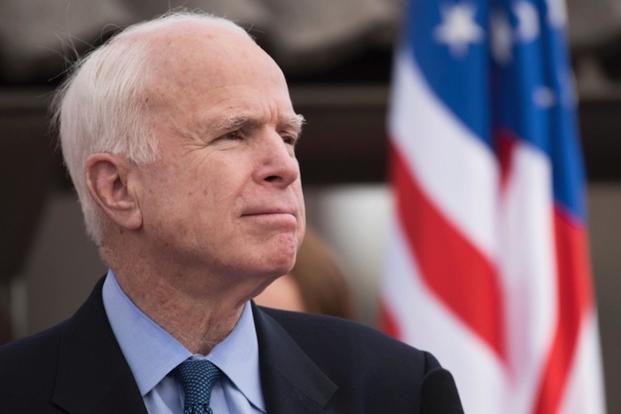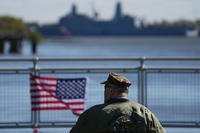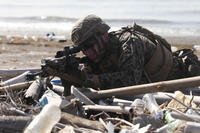Josie Beets is an Army spouse, mom to two military kids, and a recovering attorney. She serves on the board of United Through Reading, a nonprofit that connects military families through the power of reading. She is past president of a national professional organization for military spouses who are attorneys, the Military Spouse JD Network.
With the passing of Sen. John McCain, we have not only lost one of the leaders of the Senate, we have also lost a passionate evangelist for the power of public service. McCain exemplified the ideal that we are a country built on those who opt for a lifetime of serving others through both his military service and work in elected office. While he cannot be replaced, we owe it to the country to continue to search for the next generation of servant leaders in government and public office.
As a young girl visiting my grandmother, I was subject to one rule: be in bed by the time the Tonight Show with Johnny Carson came on. But there was one exception. When McCain was on the show, I was required to stay up. My grandmother and Roberta McCain, John McCain's mother, were cousins who grew up together in Muskogee, Oklahoma. Roberta and my grandmother remained lifelong friends, and the story of "Roberta's Johnny" enduring the North Vietnamese POW camps and the lessons of service, sacrifice, and leadership they included were told to me from a young age.
I grew up, marrying my own military man. When I sent Roberta my wedding announcement, she wrote back with her advice, perfected through her 96 years on this Earth and as a fellow military spouse. She said, simply, "Buckle up." She went on to express her wish that I enjoy the adventures the military would send us on through our marriage, and appreciation that there were still families willing to serve our great country.
Related content:
- On the Trail with John McCain: What I Learned on the 'Straight Talk Express'
- 'War Is Wretched Beyond Description': Quotes by John McCain
- John McCain's Hanoi Hilton Jailer Recalls 'Stubborn' POW
- McCain Died on Same Day, of Same Cancer, as Friend Ted Kennedy
- John McCain Dead at 81
But how many willing to serve are left? In our current political environment that exalts business acumen, entrepreneurship and an outsider mentality over experience in government, deliberation and bipartisanship, it can be easy to forget the careers and lives like John McCain's -- those made through serving in public office or in government service.
Service in both the military and public office is increasingly a family affair. Pentagon data from 2016 show 80 percent of active-duty service members come from a family where at least one parent, grandparent, aunt or uncle, sibling or cousin has also worn their nation's uniform. More than 25 percent have a parent who has served. Fewer and fewer Americans know someone who serves. On the national political stage, we see the same families rotating in to public service, giving the illusion of dynasties and perpetuating the notion that elected service is out of reach for most Americans.
No one was more aware of this crisis than Sen. McCain. In the 2017 National Defense Authorization Act (NDAA), he created the National Commission on Military, National and Public Service, a bipartisan, 11-member commission established to consider methods to get more Americans involved in various kinds of service to the nation.
At the time, he said, "Our nation is at a crossroads, and we must decide how we want to foster a culture of service among American men and women from all walks of life."
Particularly absent from government and public service positions are millennials, born between 1980 and 2001, who have grown up with unprecedented exposure to the scandals of government and, along with many Americans, show an increased distrust of government institutions. The Partnership for Public Service released a report of college graduates that underscored these perceptions. When asked what they planned to do immediately after graduation, a mere 5.4 percent planned to work for any level of government -- the lowest level in five years.
At the same time, millennials are more socially responsible than the generations that preceded them, and they vote with their dollars. Three-quarters of millennials are willing to spend more on a product if it comes from a sustainable brand. They give to charitable causes; 84 percent of millennials made a charitable donation in 2014, with the bulk of those donations made on their own, outside of company giving programs.
What's keeping these socially conscious, service-oriented citizens out of government and public service? Challenges include recent federal hiring freezes, underemployment, stagnant pay rates, complex hiring processes and millennial perceptions of antiquated technology in government. These challenges should be solved not only to open the doors to millennials, but to make a better working government for all that seek to have seat at the table supporting our citizens.
As a military spouse, making sure we have a diverse and highly qualified pool of people entering government and public service is important to me. When my spouse is deployed to a combat zone, I want only the best standing next to him, making sure he comes back to our family.
Somehow, it is fitting that John McCain, the person who saw the looming crisis in service, who gave so much of himself to his country while he lived, should leave us with a legacy of service that includes a way to make sure service like his is replicated in the next generation.
Through his National Commission on Military, National and Public Service, we have the opportunity to make sure those from all walks of life are allowed the opportunity to learn the values he left us with in his farewell, and so much more: "Our identities and sense of worth are not circumscribed but enlarged by serving good causes bigger than ourselves.
-- The opinions expressed in this op-ed are those of the author and do not necessarily reflect the views of Military.com. If you would like to submit your own commentary, please send your article to opinions@military.com for consideration.














